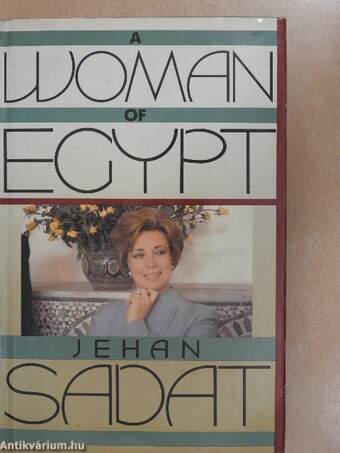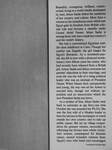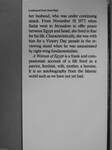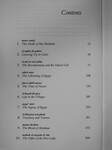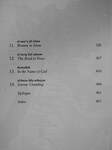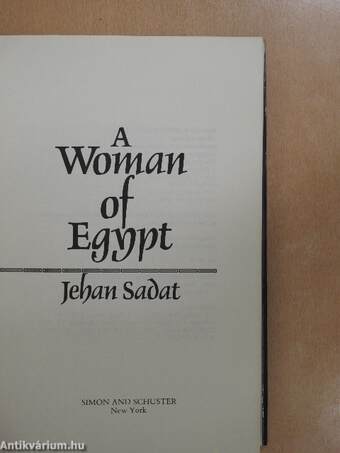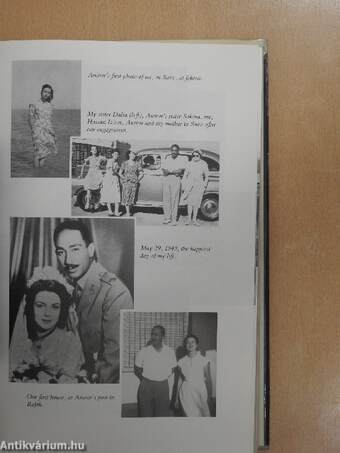1.117.545
kiadvánnyal nyújtjuk Magyarország legnagyobb antikvár könyv-kínálatát
A Woman of Egypt
| Kiadó: | Simon & Schuster, Inc. |
|---|---|
| Kiadás helye: | New York |
| Kiadás éve: | |
| Kötés típusa: | Félvászon |
| Oldalszám: | 478 oldal |
| Sorozatcím: | |
| Kötetszám: | |
| Nyelv: | Angol |
| Méret: | 24 cm x 16 cm |
| ISBN: | 0-671-54071-3 |
| Megjegyzés: | Fekete-fehér fotókkal. |
naponta értesítjük a beérkező friss
kiadványokról
naponta értesítjük a beérkező friss
kiadványokról
Fülszöveg
Beautiful, courageous, brilliant, controversial, living in a world wholly dominated by men, Jehan Sadat defied the traditions of her country and culture. More than a witness to the tumultuous years which saw Egypt gain its freedom from British colonial rule and become a republic under Gamal Abdel Nasser, Jehan Sadat is among those who have made her country's and the world's history.
She had a conventional Egyptian middle-class childhood in Cairo. Though her mother was English, the girl longed for Egypt's liberation. As a seventeen-year-old, she fell in love with a divorced revolutionary hero fifteen years her senior, who had recently been released from a British jail. Anwar Sadat and Jehan overcame her parents' objections to their marriage, and soon she was the wife of a rising political leader who was an intimate of President Nasser. When Nasser died, unexpectedly and young, the way was set for Anwar to succeed him, though not without opposition and an insurrection which the new... Tovább
Fülszöveg
Beautiful, courageous, brilliant, controversial, living in a world wholly dominated by men, Jehan Sadat defied the traditions of her country and culture. More than a witness to the tumultuous years which saw Egypt gain its freedom from British colonial rule and become a republic under Gamal Abdel Nasser, Jehan Sadat is among those who have made her country's and the world's history.
She had a conventional Egyptian middle-class childhood in Cairo. Though her mother was English, the girl longed for Egypt's liberation. As a seventeen-year-old, she fell in love with a divorced revolutionary hero fifteen years her senior, who had recently been released from a British jail. Anwar Sadat and Jehan overcame her parents' objections to their marriage, and soon she was the wife of a rising political leader who was an intimate of President Nasser. When Nasser died, unexpectedly and young, the way was set for Anwar to succeed him, though not without opposition and an insurrection which the new President Sadat put down.
As a mother of four, Jehan Sadat went back to university at age forty-one (this October she was awarded her Ph.D.). She was the first wife of a Muslim leader to have her picture in the newspaper, to travel outside her own country and to take up public causes. She set up village cooperatives for peasant women, succeeded in reforming the divorce laws which victimized women, campaigned for feminist causes, nursed wounded veterans from Egypt's wars with Israel and encouraged
(continued on back flap)
(continued from front flap)
her husband, who was under continuing attack. From November 19, 1977, when Sadat went to Jerusalem to offer peace between Egypt and Israel, she lived in fear for his life. Characteristically, she was with him for a Victory Day parade in the reviewing stand when he was assassinated by right-wing fundamentalists.
A Woman of Egypt is a frank and compassionate account of a life lived as a patriot, feminist, wife, mother, a heroine. It is an autobiography from the Islamic world such as we have not yet had. Vissza
Témakörök
- Idegennyelv > Idegennyelvű könyvek > Angol > Szépirodalom > Regény, novella, elbeszélés
- Idegennyelv > Idegennyelvű könyvek > Angol > Történelem > Egyéb
- Szépirodalom > Regény, novella, elbeszélés > Az író származása szerint > Afrika > Egyiptom
- Szépirodalom > Regény, novella, elbeszélés > Tartalom szerint > Földrajzi besorolások > Afrika
- Szépirodalom > Regény, novella, elbeszélés > Tartalom szerint > Politikai regények
- Történelem > Idegennyelvű > Angol
- Történelem > Kontinensek szerint > Afrika, afrikai országok története
- Történelem > Politika > Belpolitika > Kormányok
- Szépirodalom > Regény, novella, elbeszélés > Tartalom szerint > Történelmi regények > Legújabb kor > Egyéb
- Történelem > Legújabb kor > A hidegháború kora (1946-1991)
- Szépirodalom > Regény, novella, elbeszélés > Tartalom szerint > Életrajzi regények > Önéletrajzok, naplók, memoárok


